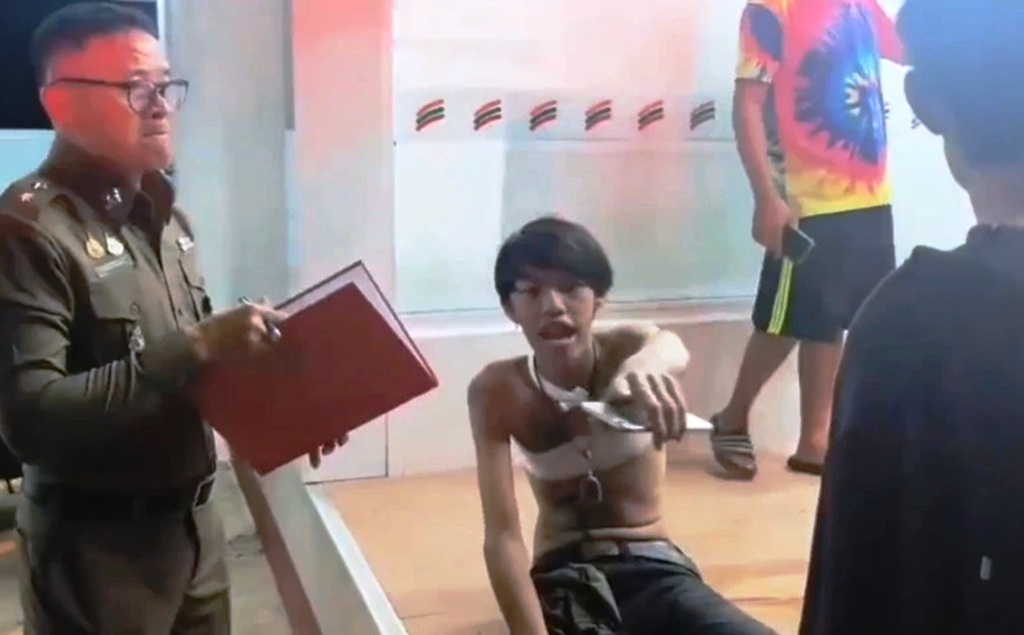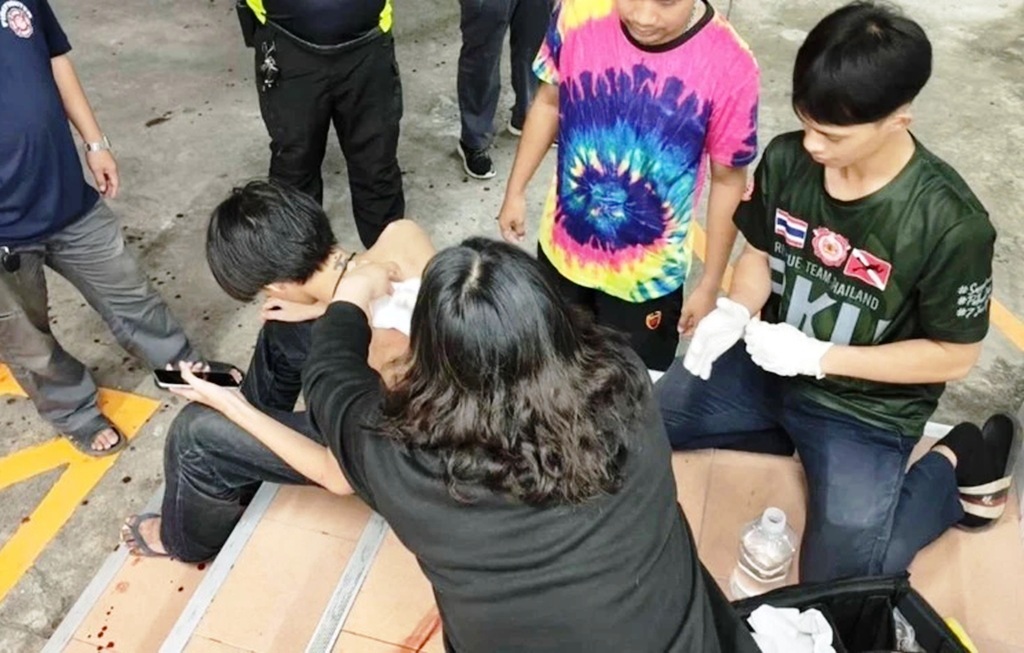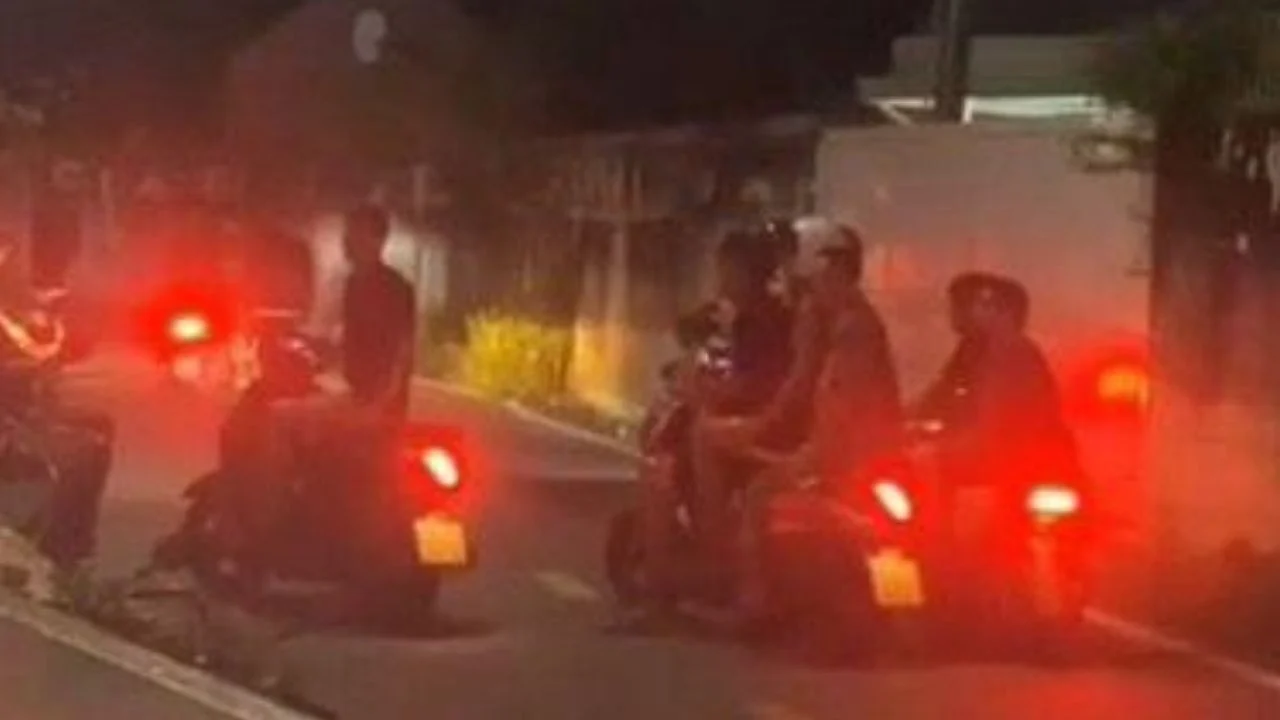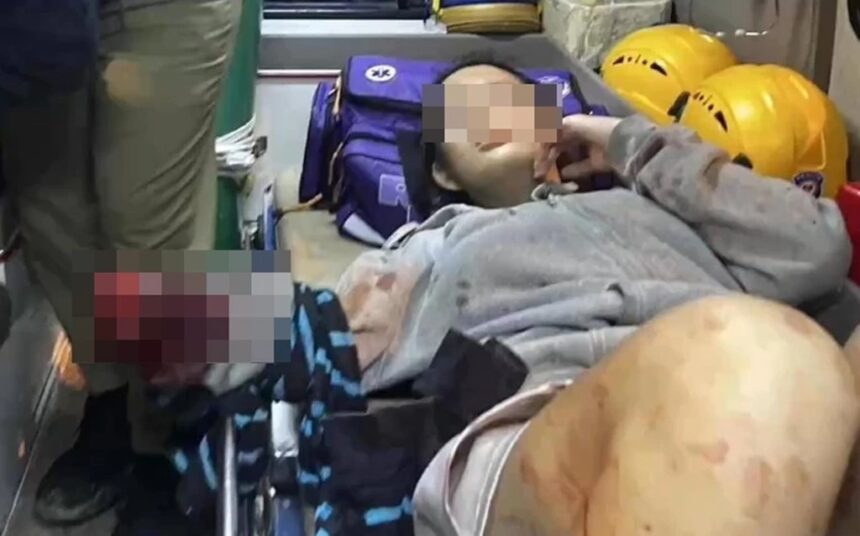CHIANG MAI – Police are hunting for a violent group of teenagers after they attacked three young people outside a 7-Eleven convenience store using machetes in the assault. A 14-year-old girl had a deep cut on her left wrist and was given first aid before being sent to a nearby hospital.
An 18-year-old boy had a knife wound in the middle of his back and also received treatment at the scene. The third victim, a 19-year-old boy, was stabbed in the back and got emergency care from rescue staff.
According to police, the attackers fled the scene before they arrived, highlighting the challenge they face in tackling street crime committed by teen groups. This rise in violence is affecting both residents and visitors, with gangs using knives, homemade explosives called ping pong bombs, and causing chaos without warning.
Witnesses describe a frightening scene. A group of between five and eight teens, shouting and waving knives, rushed at their targets. “Everything happened so quickly,” said Somchai, a local vendor who watched the attack unfold.
“They appeared without warning, shouting and showing their weapons. The kids didn’t even have a chance to escape.” The attackers disappeared before police could arrive, leaving a trail of panic and blood.

Police Reviewing CCTV
The district is equipped with several surveillance cameras, and police are carefully checking the footage to track down the gang. Pol. Maj. Gen. Thawatchai Pongwiwatchai, Deputy Commander of Provincial Police Region 5, spoke at a media briefing: “Our officers are working through the night to review recordings and compare them with records of known troublemakers.
We have strong images from several angles. We expect to catch those involved soon and press serious charges.” Possible charges include assault with a weapon and attempted murder, depending on what the evidence shows.
This is not the first time violent teens have caused problems in Chiang Mai. Over the past year, the city has seen more gang activity, with many members believed to be between 14 and 18 years old.
These groups frequently carry knives, machetes, and even homemade explosives known as ping pong bombs. Attacks often seem random and are aimed at both locals and tourists. Earlier in the year, a gang with samurai swords chased and killed a man in a similar unprovoked assault.

Curfew for Minors
The incident upset the city so much that authorities are looking to introduce a strict 10 pm curfew for minors. “They throw explosives at motorbikes, threaten shopkeepers, and attack anyone who gets in their way,” said Kanya, a shop owner in the area. “Tourists are just as much at risk, and this is hurting Chiang Mai’s reputation.”
Ping pong bombs, small homemade devices that make loud noises, are often used by gangs to frighten people or force them to run. Back in May 2024, a similar gang threw a ping pong bomb at a person riding a motorbike, causing him to fall, before attacking him with swords.
This type of violence has left many residents scared, as going out at night feels risky. “It’s not safe after dark,” said Ploy, a university student. “I worry about walking home even from class.”
Police have prioritized the fight against teen gangs by speeding up patrols, working closely with community leaders, and bringing in schools to help spot young people who may be at risk. “We aren’t just waiting for attacks to happen,” said Pol. Col. Krittapon Yi-sakhon, leading efforts on the ground. “We’ve already arrested several teens linked to earlier samurai sword incidents. But we need support from the community to spot and report suspicious behaviour.”
Beyond arrests, the police are studying what is causing the youth violence to spike. Reports suggest many gang members come from disadvantaged backgrounds, with some being migrants from neighbouring countries.

Rehabilitation for Young Offenders
Economic problems, few opportunities for education, and online content that promotes violence appear to play a part. The police now partner with local NGOs to offer rehabilitation for young offenders and aim to help steer them away from crime. “Just making arrests won’t fix it,” said Dr Somsak from Chiang Mai University. “These teenagers need guidance, support, and realistic chances to change.”
Local responses to the ongoing violence are mixed. Some residents trust the police to get results, while others believe the steps taken are not enough. “The curfew means nothing,” said Apichat, a taxi driver. “They wait until police finish patrols, then they come out again.” While some people are calling for harsher penalties and more responsibility for parents, others think better youth programmes and sports clubs might help to keep teenagers away from crime.
As the investigation into this week’s stabbing continues, the police are asking anyone with helpful information to come forward. “We will keep working to make Chiang Mai safe for everyone,” confirmed Pol. Maj. Gen. Thawatchai. CCTV footage remains a critical tool as officers work to bring those involved in the attack to justice.
The steep rise in teen gang activity challenges Chiang Mai’s reputation as a safe, cultural destination, especially as the city grows. Until deeper issues are solved, residents and tourists will rely on police and community support to regain safety in their streets.
Those with information about the recent attack can contact the Chiang Mai Provincial Police at 053-123-4567 or visit the nearest police station.















